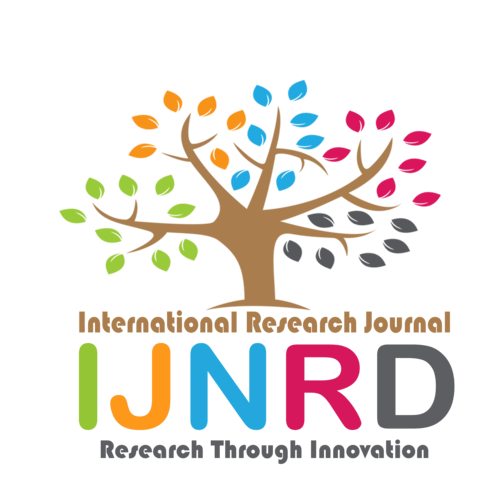|
|||||||||||||||

|
INTERNATIONAL JOURNAL OF NOVEL RESEARCH AND DEVELOPMENT International Peer Reviewed & Refereed Journals, Open Access Journal ISSN Approved Journal No: 2456-4184 | Impact factor: 8.76 | ESTD Year: 2016 Scholarly open access journals, Peer-reviewed, and Refereed Journals, Impact factor 8.76 (Calculate by google scholar and Semantic Scholar | AI-Powered Research Tool) , Multidisciplinary, Monthly, Indexing in all major database & Metadata, Citation Generator, Digital Object Identifier(DOI) |
||||||||||||||
Issue: April 2024
Volume 9 | Issue 4
Review Result and Publication of Paper within : 2-3 days
Click Here For more DetailsFor Authors
Forms / Download
Published Issue Details
Editorial Board
Other IMP Links
Facts & Figure
Impact Factor : 8.76
Issue per Year : 12
Volume Published : 9
Issue Published : 95
Article Submitted :
Article Published :
Total Authors :
Total Reviewer :
Total Countries :
Indexing Partner
Join RMS/Earn 300
Licence
This work is licensed under a Creative Commons Attribution-NonCommercial 4.0 International License







|
Published Paper Details
|
|
| Paper Title: | Knowledge, Attitude and Practice of Ayurveda Dietary Principles among Ayurveda graduates in Mumbai city: A Cross-sectional Study |
| Authors Name: | Ms. Riya Mishra , Dr. Rekha Battalwar , Dr. Jagmeet Madan , Dr. Ajay Salunkhe |
| Download E-Certificate: | Download |
| Author Reg. ID: |
IJNRD_181992
|
| Published Paper Id: | IJNRD2207047 |
| Published In: | Volume 7 Issue 7, July-2022 |
| DOI: | |
| Abstract: | Background: Food is the major source for serving nutritional needs, but with growing modernization some traditional methods have been given up. However, affluence of the working population with changing lifestyles and reducing affordability of sick care, in terms of time and money involved, are some of the forces that are presently driving people towards thinking about their wellness. There has been increased global interest in traditional medicine. Ayurveda, the traditional Indian medicine, remains the most ancient yet living tradition. Thus to live up to the expected standards and bring significant effects of Ayurveda in future, it is important that budding Ayurveda professionals have strong knowledge of dietary principles of Ayurveda and have appropriate attitude and behaviour since they will be the mainstay of health care delivery in the future. Thus, in this study the undergraduate Ayurveda students were assessed for their knowledge, attitude and practice of Ayurveda dietary principles. Aim: The aim of the study was to assess knowledge, attitude and practice of Ayurveda dietary principles among Ayurveda graduates in Mumbai city. Methodology: The study was carried out on 97 third and fourth year students graduating in Ayurveda. Participants were selected by the purposive convenience sampling method from Ayurveda colleges located in Mumbai. Participant information sheet and consent form was obtained from the participants. A hybrid mode was used to collect the data. The self-structured KAP questionnaire was administered through google form and two day 24-hours dietary recall was collected through phone calls and google meet. Data was analyzed using SPSS software version 25. Results: Out of a total of 97 participants, the majority of male (74.2%) and female (90.9%) participants were able to identify that eating foods too fast or too slow is a behavior that is not recommended by Aahar Vidhi Vidhaan (p-value 0.029). Also, the majority of male (71%) and female (86.4 %) participants had knowledge of recommended activities after a meal according to Aahar Vidhi Vidhaan (p-value 0.027). About 50% of males and 77.3% of female participants had knowledge of Avasta Paak as they were able to identify the effect of different stages of digestion on Dosha (p-value 0.047). Males were found to practice Jal Sevan Niyam ( p-value 0.034). Ayurveda was found as the preferred medical treatment for their personal needs (94.8%). When asked for promoting Ayurvedic dietary principles in India, 99% of participants agreed that more efforts are needed. The majority of participants who believed in the Ayurveda principle were found to have 22 years of age (p-value of 0.004). Integration of Ayurveda with modern dietetics was supported by 78.4% of participants. Prolonged duration for effectiveness was the major barrier to using Ayurvedic dietary principles (34%). The mean knowledge, attitude, and practice score were 6.8, 34.4, and 20.1 respectively. 58.8% of participants had fair knowledge, except for one, all the participants had a positive attitude (95.9%) and 81.4% of participants had a fair practice of dietary principles of Ayurveda. Thus the current study revealed that Ayurveda graduates had good knowledge, positive attitude, and fair practice of Ayurveda dietary principles. Conclusion: In the study, it was found that Ayurveda students had knowledge about dietary principles of Ayurveda. They had a positive attitude towards these principles and therefore practiced them in their daily life. However, participants experienced some barriers in following these principles. It was revealed that increased government initiatives, scientific validation and integration of Ayurvedic dietary principles with modern dietetics will lead to increased acceptance of Ayurvedic dietary principles. Thus, there is a need to support Ayurvedic dietary principles by overcoming the barriers and making strategies to globalize and promote Ayurveda. |
| Keywords: | Ayurvedic dietary principles, Ahara, Knowledge, Practice, Dietary recall |
| Cite Article: | "Knowledge, Attitude and Practice of Ayurveda Dietary Principles among Ayurveda graduates in Mumbai city: A Cross-sectional Study", International Journal of Novel Research and Development (www.ijnrd.org), ISSN:2456-4184, Vol.7, Issue 7, page no.365-377, July-2022, Available :http://www.ijnrd.org/papers/IJNRD2207047.pdf |
| Downloads: | 000118756 |
| ISSN: |
2456-4184 | IMPACT FACTOR: 8.76 Calculated By Google Scholar| ESTD YEAR: 2016 An International Scholarly Open Access Journal, Peer-Reviewed, Refereed Journal Impact Factor 8.76 Calculate by Google Scholar and Semantic Scholar | AI-Powered Research Tool, Multidisciplinary, Monthly, Multilanguage Journal Indexing in All Major Database & Metadata, Citation Generator |
| Publication Details: |
Published Paper ID:IJNRD2207047 Registration ID: 181992 Published In: Volume 7 Issue 7, July-2022 DOI (Digital Object Identifier): Page No: 365-377 Country: -, -, - Research Area: Engineering Publisher : IJ Publication Published Paper URL : https://www.ijnrd.org/viewpaperforall?paper=IJNRD2207047 Published Paper PDF: https://www.ijnrd.org/papers/IJNRD2207047 |
| Share Article: | |
|
Click Here to Download This Article |
|
| Article Preview | |
|
|
|
Major Indexing from www.ijnrd.org
| Semantic Scholar | Microsaoft Academic | ORCID | Zenodo |
| Google Scholar | ResearcherID Thomson Reuters | Mendeley : reference manager | Academia.edu |
| arXiv.org : cornell university library | Research Gate | CiteSeerX | PUBLON |
| DRJI | SSRN | Scribd | DocStoc |
ISSN Details
 |
 |
ISSN: 2456-4184
Impact Factor: 8.76 and ISSN APPROVED
Journal Starting Year (ESTD) : 2016
DOI (A digital object identifier)
Conference
Open Access License Policy
Important Details
Social Media
| Copyright © 2024 - All Rights Reserved - IJNRD |












Facebook Twitter Instagram LinkedIn